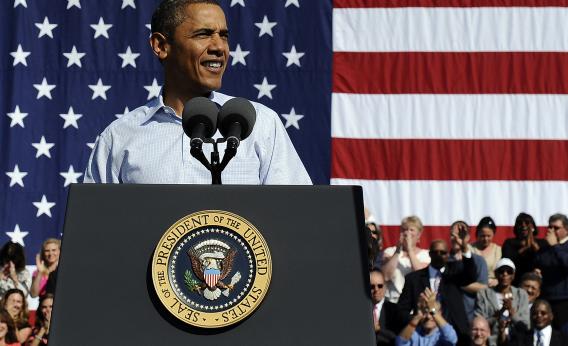Congress Should Pass Obama’s Jobs Plan—Piece by Piece
Watch—and participate in—the Slate/Intelligence Squared live debate on Oct. 25.

Photo by Jewel Samad/AFP/Getty Images.
On Sept. 8, 2011, President Obama unveiled his major new economic initiative, the American Jobs Act, with great fanfare, and a caveat. "I don’t pretend that this plan will solve all our problems," he said. Still, he told Congress repeatedly, "This plan is the right thing to do right now. You should pass it."
In the face of a potential double-dip recession and an unparalleled long-term unemployment rate, he's having little luck convincing Congress to pass his bill: Last week, the Jobs Act died in the Senate before it could even be debated. Now, the president says he plans to push individual sections of the legislation through the chambers.
The merit of his proposals is the subject of the next Slate/Intelligence Squared U.S. live debate on Oct. 25. We'd like to invite you to attend the debate—we're offering Slate readers a 30 percent discount on tickets (see below)—and you're invited to submit questions for the debaters. We'll pick the most interesting one, and moderator John Donvan will ask it at the debate.
Can't be at the debate? Check back tonight for live-streaming video:
The motion for the debate is “Obama’s Congress should pass Obama's jobs plan—piece by piece.” The president's Jobs Act includes a continuation of the payroll tax cut, infrastructure investment, employer tax breaks for hiring the long-term unemployed, and an extension of unemployment insurance. Opponents say the Jobs Act is a shoddy replica of the supposedly failed stimulus act of 2009. Supporters warn that if we don't pass the act, we'll almost certainly be headed for another recession. Will his plan bring a fast, effective boost to the job market, or will higher taxes punish job creators and sink us further into debt?
Join us at NYU's Skirball Center in New York City for an Oxford-style live debate. Princeton University professor and former member of the Council of Economic Advisers Cecilia Rouse will pair with Chief Economist of Moody's Analytics Mark Zandi to argue for the motion and the jobs plan. New York University law school professor Richard Epstein and Daniel Mitchell, a senior fellow at the Cato Institute, will argue against the motion.
If you've got a question for the debaters, write it below in the comments section of this article. We'll select one to read live at the debate. Be sure to include your full name and hometown with your question.
The details about the debate:
When/Where: Oct. 25, 2011, at Skirball Center for the Performing Arts, New York University, located at 566 LaGuardia Place (at Washington Square South). The evening begins at 5:45 p.m. with a cash-bar reception for panelists and audience members; the live debate starts at 6:45 p.m. and ends at 8:30 p.m. For venue information, click here.
Tickets: $40 ($12 for students with ID). Purchase tickets here, and be sure to enter the special Slate promotional discount code, Slate30, to receive 30 percent off your ticket.
About the debaters
For the motion:
Cecilia Rouse is the Katzman-Ernst professor in the economics of education and professor of economics and public affairs at Princeton University. Her primary research interests are in labor economics with a focus on the economics of education. In 1998-99 Rouse served a year in the White House at the National Economic Council and from 2009-2011 served as a member of the president’s Council of Economic Advisers. Rouse has served as an editor of the Journal of Labor Economics and is currently a senior editor of The Future of Children. With a Ph.D. in economics from Harvard University, she is the founding director of the Princeton University Education Research Section.
Mark Zandi is the chief economist of Moody’s Analytics and directs the company’s research and consulting activities. Zandi’s recent research has studied the determinants of mortgage foreclosure and personal bankruptcy, analyzed the economic impact of various tax and government spending policies, and assessed the appropriate policy response to bubbles in asset markets. Frequently testifying before Congress, Zandi is a trusted adviser to policymakers on topics including the economic outlook, the merits of fiscal stimulus, financial regulatory reform, and foreclosure mitigation. Zandi received his Ph.D. at the University of Pennsylvania, where he did his research with Gerard Adams and Nobel laureate Lawrence Klein.
Against the motion:
Richard Epstein is the Inaugural Laurence A. Tisch professor of law at New York University School of Law, the Peter and Kirsten Bedford senior fellow at the Hoover Institution, and the James Parker Hall distinguished service professor of law emeritus and senior lecturer at the University of Chicago. He has been a member of the American Academy of Arts and Sciences since 1985 and has been a senior fellow of the Center for Clinical Medical Ethics at the University of Chicago Medical School since 1983. He has taught courses in contracts, employment discrimination, and labor law. His books include Design for Liberty: Private Property, Public Administration, and the Rule of Law and The Case Against the Employee Free Choice Act.
Daniel Mitchell is a senior fellow at the Cato Institute. He is a top expert on tax reform and supply-side tax policy, advocating for a flat tax and international tax competition. Prior to joining Cato, Mitchell was a senior fellow with The Heritage Foundation and an economist for Sen. Bob Packwood and the Senate Finance Committee. He also served on the 1988 Bush/Quayle transition team and was director of tax and budget policy for Citizens for a Sound Economy. Mitchell holds bachelor's and master's degrees in economics from the University of Georgia and a Ph.D. in economics from George Mason University.
The moderator:
John Donvan is a correspondent for ABC News’ Nightline. He has served as ABC White House correspondent, along with postings in Moscow, London, Jerusalem, and Amman.